Constitutional Law and Adult Entertainment: Texas 'Pole Tax' Impact
VerifiedAdded on 2023/04/11
|5
|1177
|112
Report
AI Summary
This report provides a legal analysis of the Texas Supreme Court's ruling on the 'pole tax,' a $5 per customer fee imposed on strip clubs serving alcohol, and its implications for the New York Entertainment Association. The central constitutional issue revolves around the First Amendment right to freedom of expression, with club owners arguing that nude entertainment is a protected activity. The Texas court upheld the tax, citing its aim to address the secondary effects of combining nude dancing and alcohol consumption. The report discusses the possibility of further appeals to the US Supreme Court and advises the CEO of the New York Entertainment Association that Texas laws are not directly binding in New York, unless they involve constitutional issues or are upheld by a superior court. The analysis also suggests that while freedom of expression is a constitutional right, the court may apply a rational basis test, balancing this right against the potential negative impacts of businesses. The report concludes that the imposition of such a tax could be viewed as an infringement on fundamental rights.
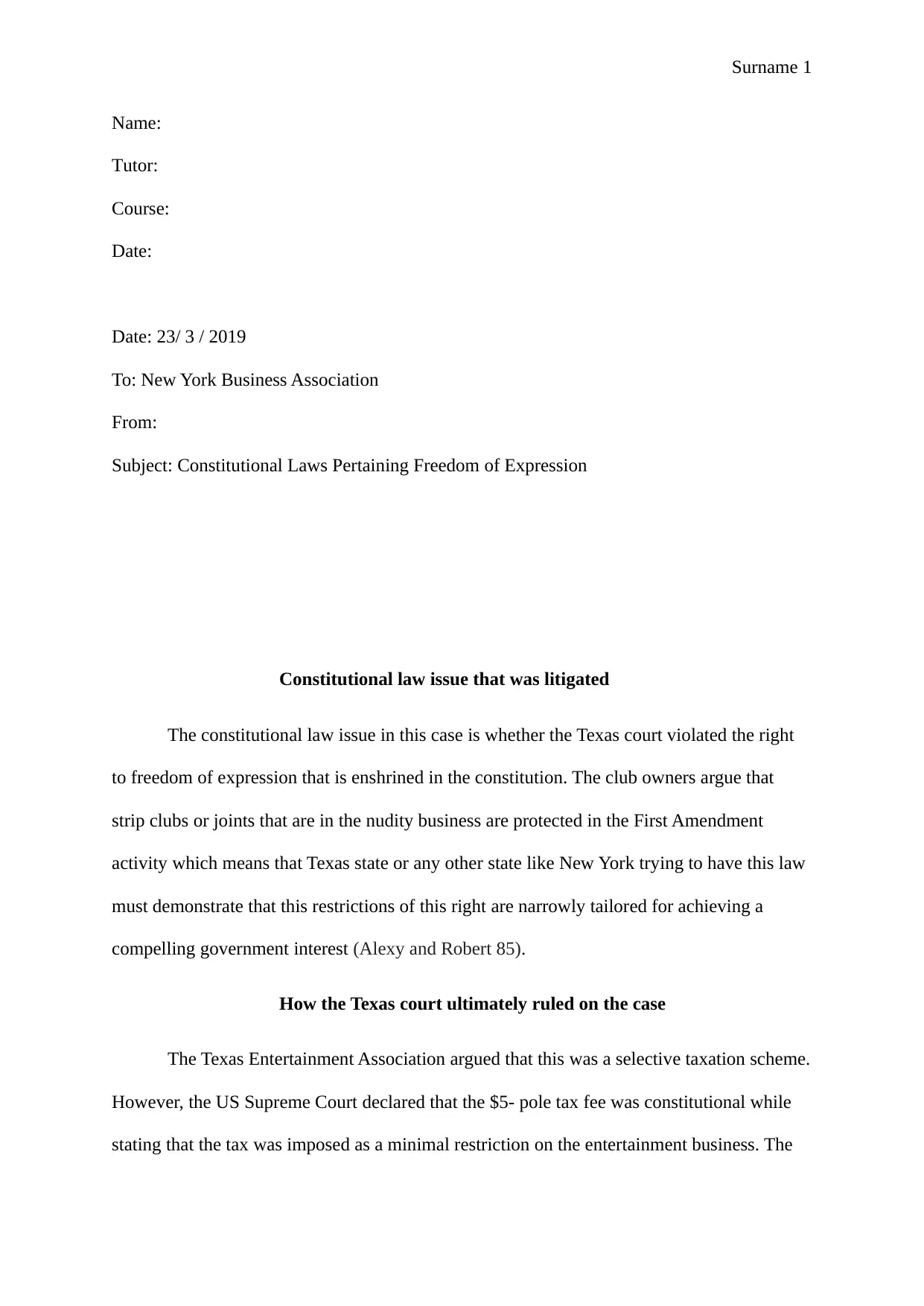
Surname 1
Name:
Tutor:
Course:
Date:
Date: 23/ 3 / 2019
To: New York Business Association
From:
Subject: Constitutional Laws Pertaining Freedom of Expression
Constitutional law issue that was litigated
The constitutional law issue in this case is whether the Texas court violated the right
to freedom of expression that is enshrined in the constitution. The club owners argue that
strip clubs or joints that are in the nudity business are protected in the First Amendment
activity which means that Texas state or any other state like New York trying to have this law
must demonstrate that this restrictions of this right are narrowly tailored for achieving a
compelling government interest (Alexy and Robert 85).
How the Texas court ultimately ruled on the case
The Texas Entertainment Association argued that this was a selective taxation scheme.
However, the US Supreme Court declared that the $5- pole tax fee was constitutional while
stating that the tax was imposed as a minimal restriction on the entertainment business. The
Name:
Tutor:
Course:
Date:
Date: 23/ 3 / 2019
To: New York Business Association
From:
Subject: Constitutional Laws Pertaining Freedom of Expression
Constitutional law issue that was litigated
The constitutional law issue in this case is whether the Texas court violated the right
to freedom of expression that is enshrined in the constitution. The club owners argue that
strip clubs or joints that are in the nudity business are protected in the First Amendment
activity which means that Texas state or any other state like New York trying to have this law
must demonstrate that this restrictions of this right are narrowly tailored for achieving a
compelling government interest (Alexy and Robert 85).
How the Texas court ultimately ruled on the case
The Texas Entertainment Association argued that this was a selective taxation scheme.
However, the US Supreme Court declared that the $5- pole tax fee was constitutional while
stating that the tax was imposed as a minimal restriction on the entertainment business. The
Paraphrase This Document
Need a fresh take? Get an instant paraphrase of this document with our AI Paraphraser
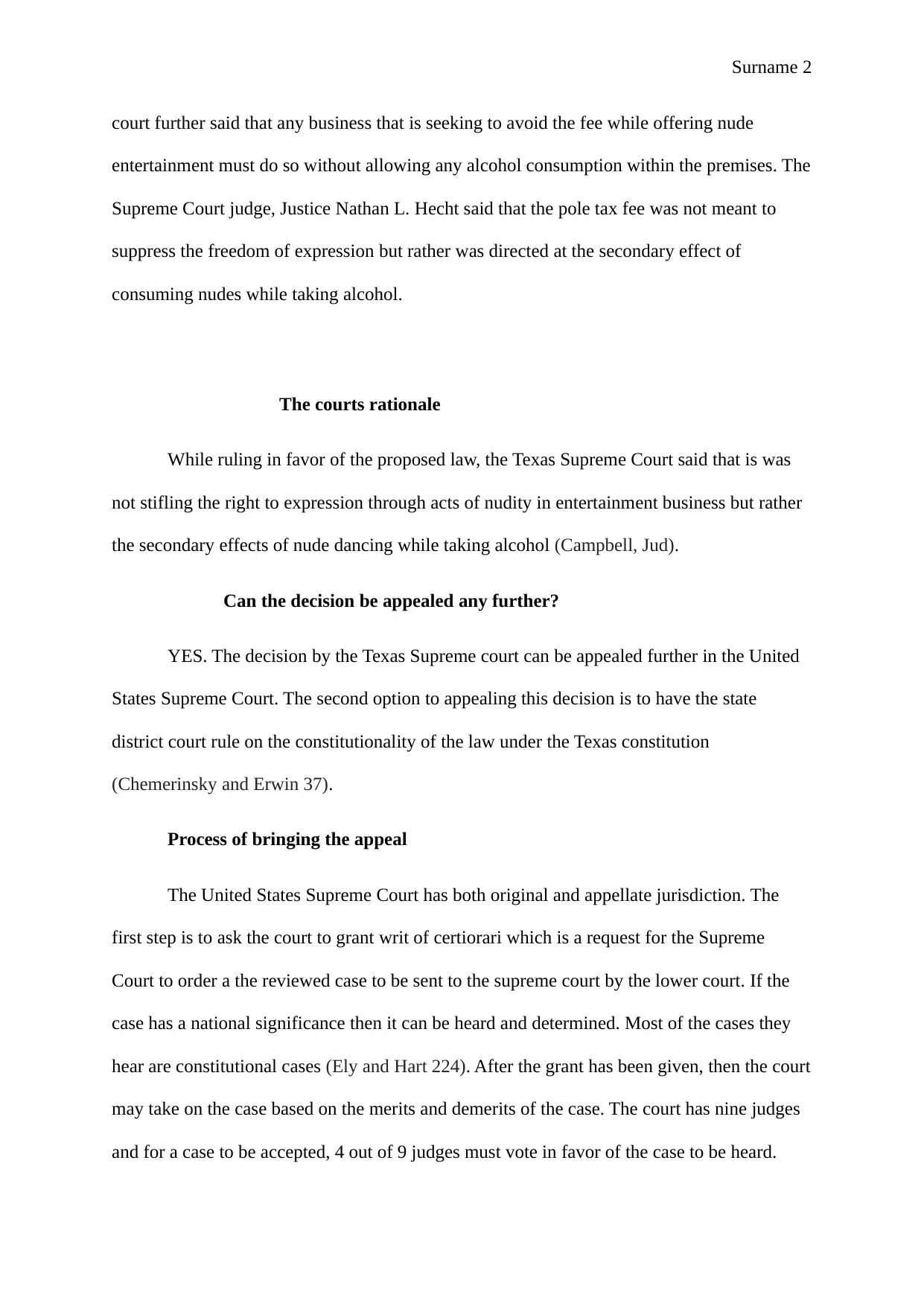
Surname 2
court further said that any business that is seeking to avoid the fee while offering nude
entertainment must do so without allowing any alcohol consumption within the premises. The
Supreme Court judge, Justice Nathan L. Hecht said that the pole tax fee was not meant to
suppress the freedom of expression but rather was directed at the secondary effect of
consuming nudes while taking alcohol.
The courts rationale
While ruling in favor of the proposed law, the Texas Supreme Court said that is was
not stifling the right to expression through acts of nudity in entertainment business but rather
the secondary effects of nude dancing while taking alcohol (Campbell, Jud).
Can the decision be appealed any further?
YES. The decision by the Texas Supreme court can be appealed further in the United
States Supreme Court. The second option to appealing this decision is to have the state
district court rule on the constitutionality of the law under the Texas constitution
(Chemerinsky and Erwin 37).
Process of bringing the appeal
The United States Supreme Court has both original and appellate jurisdiction. The
first step is to ask the court to grant writ of certiorari which is a request for the Supreme
Court to order a the reviewed case to be sent to the supreme court by the lower court. If the
case has a national significance then it can be heard and determined. Most of the cases they
hear are constitutional cases (Ely and Hart 224). After the grant has been given, then the court
may take on the case based on the merits and demerits of the case. The court has nine judges
and for a case to be accepted, 4 out of 9 judges must vote in favor of the case to be heard.
court further said that any business that is seeking to avoid the fee while offering nude
entertainment must do so without allowing any alcohol consumption within the premises. The
Supreme Court judge, Justice Nathan L. Hecht said that the pole tax fee was not meant to
suppress the freedom of expression but rather was directed at the secondary effect of
consuming nudes while taking alcohol.
The courts rationale
While ruling in favor of the proposed law, the Texas Supreme Court said that is was
not stifling the right to expression through acts of nudity in entertainment business but rather
the secondary effects of nude dancing while taking alcohol (Campbell, Jud).
Can the decision be appealed any further?
YES. The decision by the Texas Supreme court can be appealed further in the United
States Supreme Court. The second option to appealing this decision is to have the state
district court rule on the constitutionality of the law under the Texas constitution
(Chemerinsky and Erwin 37).
Process of bringing the appeal
The United States Supreme Court has both original and appellate jurisdiction. The
first step is to ask the court to grant writ of certiorari which is a request for the Supreme
Court to order a the reviewed case to be sent to the supreme court by the lower court. If the
case has a national significance then it can be heard and determined. Most of the cases they
hear are constitutional cases (Ely and Hart 224). After the grant has been given, then the court
may take on the case based on the merits and demerits of the case. The court has nine judges
and for a case to be accepted, 4 out of 9 judges must vote in favor of the case to be heard.
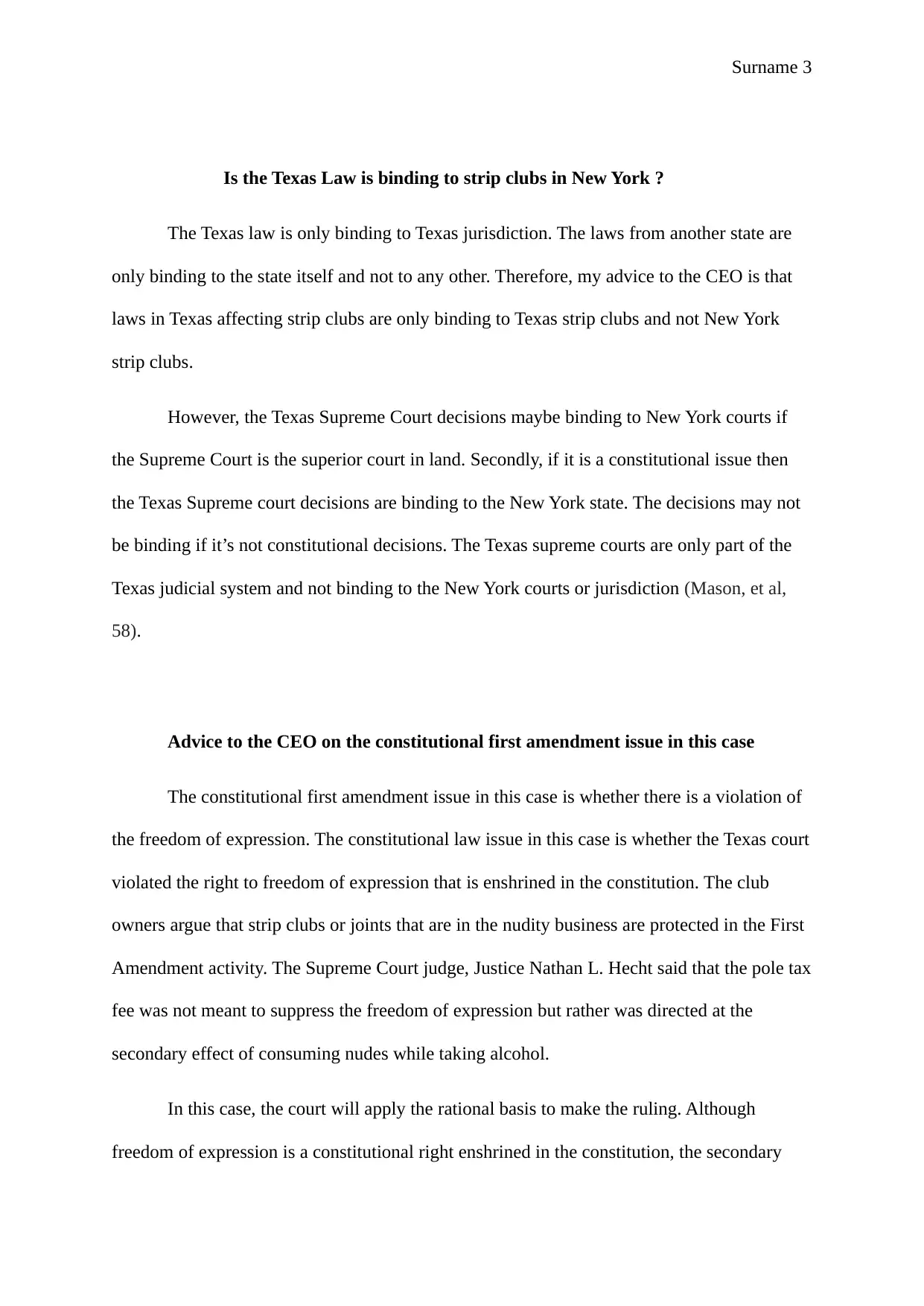
Surname 3
Is the Texas Law is binding to strip clubs in New York ?
The Texas law is only binding to Texas jurisdiction. The laws from another state are
only binding to the state itself and not to any other. Therefore, my advice to the CEO is that
laws in Texas affecting strip clubs are only binding to Texas strip clubs and not New York
strip clubs.
However, the Texas Supreme Court decisions maybe binding to New York courts if
the Supreme Court is the superior court in land. Secondly, if it is a constitutional issue then
the Texas Supreme court decisions are binding to the New York state. The decisions may not
be binding if it’s not constitutional decisions. The Texas supreme courts are only part of the
Texas judicial system and not binding to the New York courts or jurisdiction (Mason, et al,
58).
Advice to the CEO on the constitutional first amendment issue in this case
The constitutional first amendment issue in this case is whether there is a violation of
the freedom of expression. The constitutional law issue in this case is whether the Texas court
violated the right to freedom of expression that is enshrined in the constitution. The club
owners argue that strip clubs or joints that are in the nudity business are protected in the First
Amendment activity. The Supreme Court judge, Justice Nathan L. Hecht said that the pole tax
fee was not meant to suppress the freedom of expression but rather was directed at the
secondary effect of consuming nudes while taking alcohol.
In this case, the court will apply the rational basis to make the ruling. Although
freedom of expression is a constitutional right enshrined in the constitution, the secondary
Is the Texas Law is binding to strip clubs in New York ?
The Texas law is only binding to Texas jurisdiction. The laws from another state are
only binding to the state itself and not to any other. Therefore, my advice to the CEO is that
laws in Texas affecting strip clubs are only binding to Texas strip clubs and not New York
strip clubs.
However, the Texas Supreme Court decisions maybe binding to New York courts if
the Supreme Court is the superior court in land. Secondly, if it is a constitutional issue then
the Texas Supreme court decisions are binding to the New York state. The decisions may not
be binding if it’s not constitutional decisions. The Texas supreme courts are only part of the
Texas judicial system and not binding to the New York courts or jurisdiction (Mason, et al,
58).
Advice to the CEO on the constitutional first amendment issue in this case
The constitutional first amendment issue in this case is whether there is a violation of
the freedom of expression. The constitutional law issue in this case is whether the Texas court
violated the right to freedom of expression that is enshrined in the constitution. The club
owners argue that strip clubs or joints that are in the nudity business are protected in the First
Amendment activity. The Supreme Court judge, Justice Nathan L. Hecht said that the pole tax
fee was not meant to suppress the freedom of expression but rather was directed at the
secondary effect of consuming nudes while taking alcohol.
In this case, the court will apply the rational basis to make the ruling. Although
freedom of expression is a constitutional right enshrined in the constitution, the secondary
⊘ This is a preview!⊘
Do you want full access?
Subscribe today to unlock all pages.

Trusted by 1+ million students worldwide
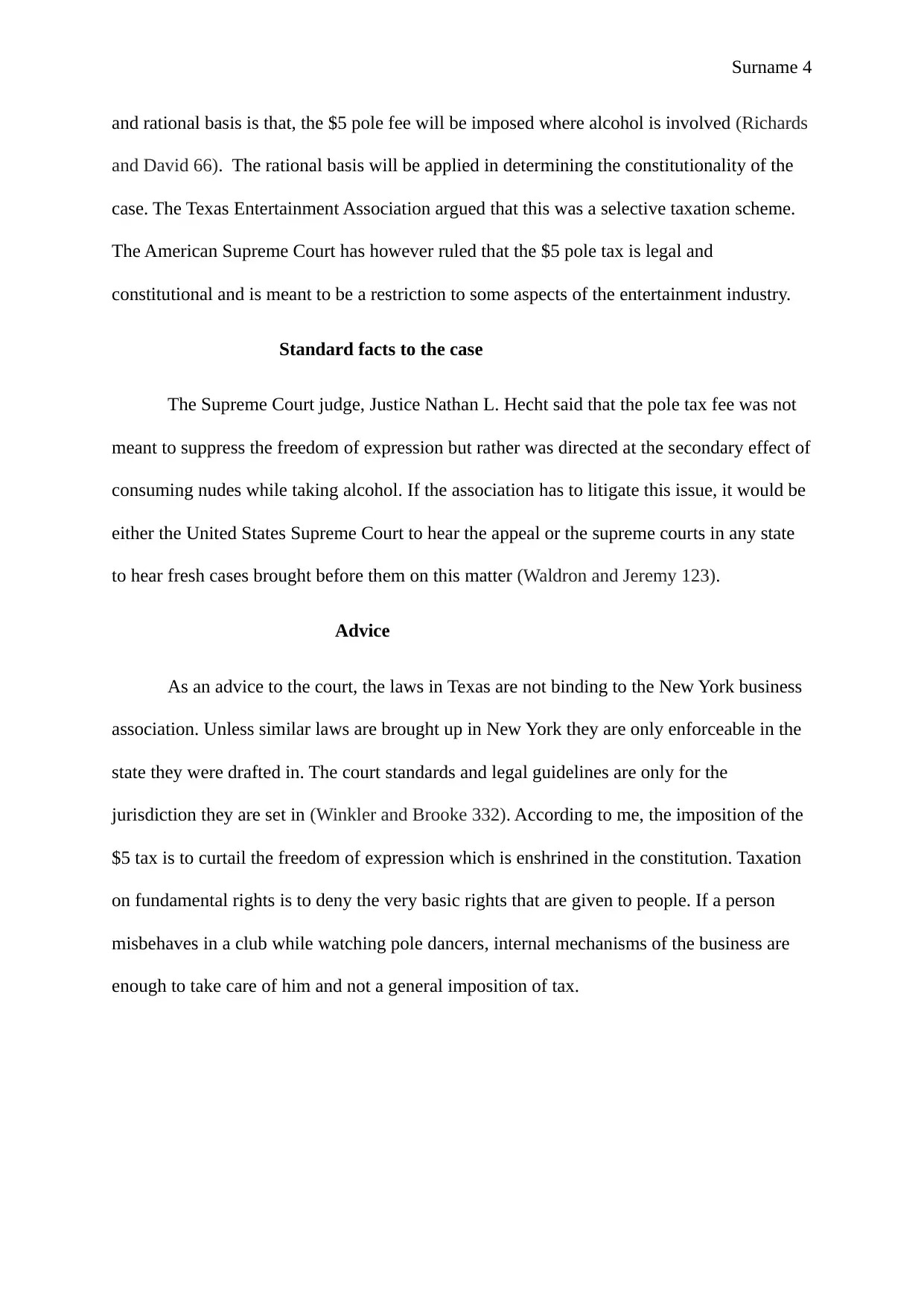
Surname 4
and rational basis is that, the $5 pole fee will be imposed where alcohol is involved (Richards
and David 66). The rational basis will be applied in determining the constitutionality of the
case. The Texas Entertainment Association argued that this was a selective taxation scheme.
The American Supreme Court has however ruled that the $5 pole tax is legal and
constitutional and is meant to be a restriction to some aspects of the entertainment industry.
Standard facts to the case
The Supreme Court judge, Justice Nathan L. Hecht said that the pole tax fee was not
meant to suppress the freedom of expression but rather was directed at the secondary effect of
consuming nudes while taking alcohol. If the association has to litigate this issue, it would be
either the United States Supreme Court to hear the appeal or the supreme courts in any state
to hear fresh cases brought before them on this matter (Waldron and Jeremy 123).
Advice
As an advice to the court, the laws in Texas are not binding to the New York business
association. Unless similar laws are brought up in New York they are only enforceable in the
state they were drafted in. The court standards and legal guidelines are only for the
jurisdiction they are set in (Winkler and Brooke 332). According to me, the imposition of the
$5 tax is to curtail the freedom of expression which is enshrined in the constitution. Taxation
on fundamental rights is to deny the very basic rights that are given to people. If a person
misbehaves in a club while watching pole dancers, internal mechanisms of the business are
enough to take care of him and not a general imposition of tax.
and rational basis is that, the $5 pole fee will be imposed where alcohol is involved (Richards
and David 66). The rational basis will be applied in determining the constitutionality of the
case. The Texas Entertainment Association argued that this was a selective taxation scheme.
The American Supreme Court has however ruled that the $5 pole tax is legal and
constitutional and is meant to be a restriction to some aspects of the entertainment industry.
Standard facts to the case
The Supreme Court judge, Justice Nathan L. Hecht said that the pole tax fee was not
meant to suppress the freedom of expression but rather was directed at the secondary effect of
consuming nudes while taking alcohol. If the association has to litigate this issue, it would be
either the United States Supreme Court to hear the appeal or the supreme courts in any state
to hear fresh cases brought before them on this matter (Waldron and Jeremy 123).
Advice
As an advice to the court, the laws in Texas are not binding to the New York business
association. Unless similar laws are brought up in New York they are only enforceable in the
state they were drafted in. The court standards and legal guidelines are only for the
jurisdiction they are set in (Winkler and Brooke 332). According to me, the imposition of the
$5 tax is to curtail the freedom of expression which is enshrined in the constitution. Taxation
on fundamental rights is to deny the very basic rights that are given to people. If a person
misbehaves in a club while watching pole dancers, internal mechanisms of the business are
enough to take care of him and not a general imposition of tax.
Paraphrase This Document
Need a fresh take? Get an instant paraphrase of this document with our AI Paraphraser
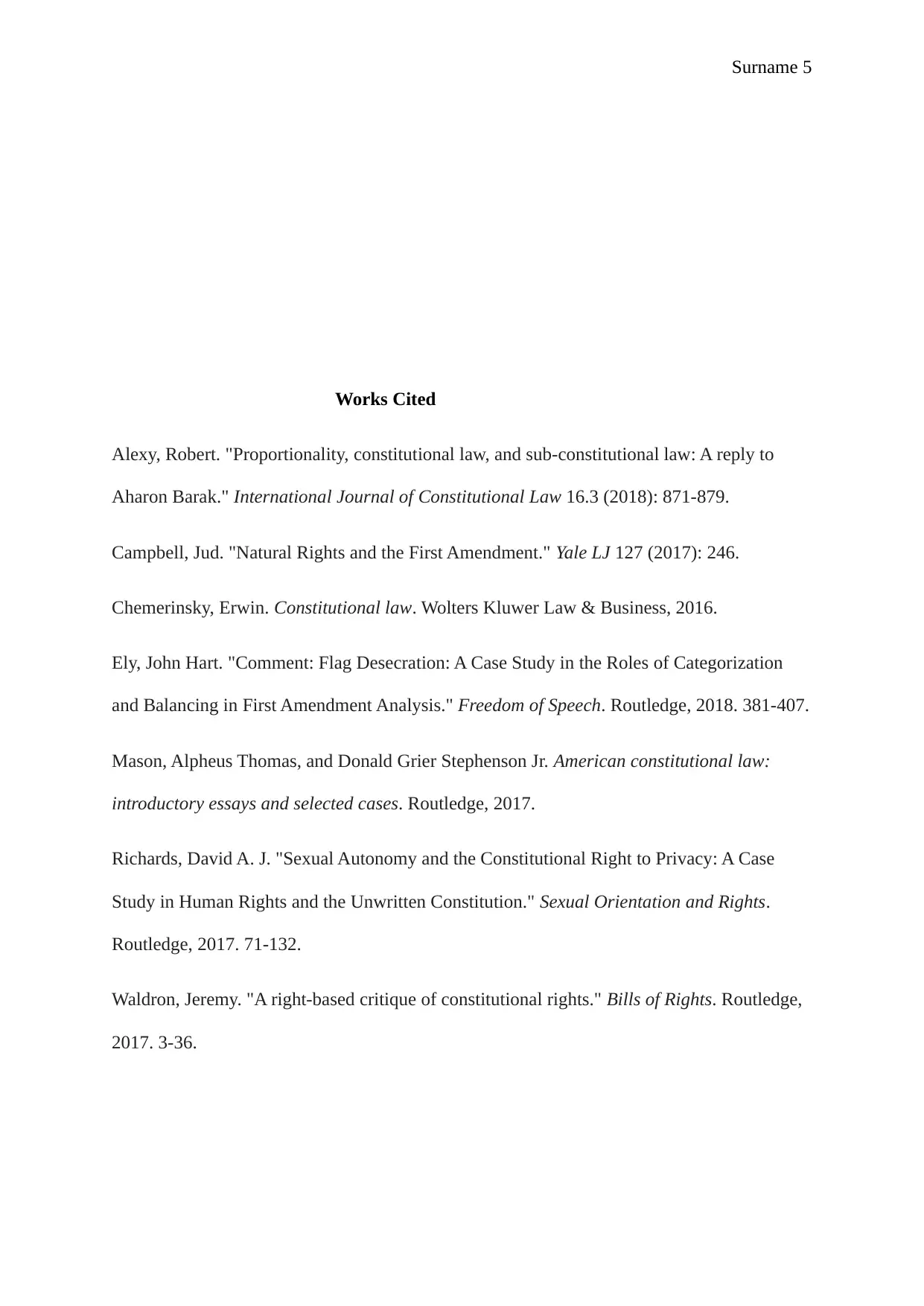
Surname 5
Works Cited
Alexy, Robert. "Proportionality, constitutional law, and sub-constitutional law: A reply to
Aharon Barak." International Journal of Constitutional Law 16.3 (2018): 871-879.
Campbell, Jud. "Natural Rights and the First Amendment." Yale LJ 127 (2017): 246.
Chemerinsky, Erwin. Constitutional law. Wolters Kluwer Law & Business, 2016.
Ely, John Hart. "Comment: Flag Desecration: A Case Study in the Roles of Categorization
and Balancing in First Amendment Analysis." Freedom of Speech. Routledge, 2018. 381-407.
Mason, Alpheus Thomas, and Donald Grier Stephenson Jr. American constitutional law:
introductory essays and selected cases. Routledge, 2017.
Richards, David A. J. "Sexual Autonomy and the Constitutional Right to Privacy: A Case
Study in Human Rights and the Unwritten Constitution." Sexual Orientation and Rights.
Routledge, 2017. 71-132.
Waldron, Jeremy. "A right-based critique of constitutional rights." Bills of Rights. Routledge,
2017. 3-36.
Works Cited
Alexy, Robert. "Proportionality, constitutional law, and sub-constitutional law: A reply to
Aharon Barak." International Journal of Constitutional Law 16.3 (2018): 871-879.
Campbell, Jud. "Natural Rights and the First Amendment." Yale LJ 127 (2017): 246.
Chemerinsky, Erwin. Constitutional law. Wolters Kluwer Law & Business, 2016.
Ely, John Hart. "Comment: Flag Desecration: A Case Study in the Roles of Categorization
and Balancing in First Amendment Analysis." Freedom of Speech. Routledge, 2018. 381-407.
Mason, Alpheus Thomas, and Donald Grier Stephenson Jr. American constitutional law:
introductory essays and selected cases. Routledge, 2017.
Richards, David A. J. "Sexual Autonomy and the Constitutional Right to Privacy: A Case
Study in Human Rights and the Unwritten Constitution." Sexual Orientation and Rights.
Routledge, 2017. 71-132.
Waldron, Jeremy. "A right-based critique of constitutional rights." Bills of Rights. Routledge,
2017. 3-36.
1 out of 5
Your All-in-One AI-Powered Toolkit for Academic Success.
+13062052269
info@desklib.com
Available 24*7 on WhatsApp / Email
![[object Object]](/_next/static/media/star-bottom.7253800d.svg)
Unlock your academic potential
Copyright © 2020–2026 A2Z Services. All Rights Reserved. Developed and managed by ZUCOL.
